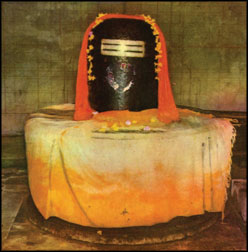|
Maha Sivarathri observances at Thiruketheeswaram:
Pilgrimage via Pooneryn
By Ananth PALAKIDNAR
Many Sri Lankans would imagine Pooneryn, which was regained by the
Security Forces from the grip of the LTTE last year as a battle scarred
area in the north-west of Jaffna peninsula.
|

Maha Sivalingam of Thiruketheeswaram temple was excavated by
archaeologists in the fifties.During the Portugese period the
temple was destroyed and the Lingam got buried . |
But for decades, Pooneryn which is in Kilinoch -chi district remained
a spir-itual hub and it was through this region that Hindus from the
peninsula made their annual pilgrimage along A-32 to observe Maha
Sivarathri at Thiruketheeswaram, considered as one of the foremost
shrines of Lord Siva in Sri Lanka.
Thiruketheeswaram is situated in Mannar and historians believe the
temple would have been built in 300 BC. A Hindu saint,
Thirugnanasampanthar of South India during the Pallava period in 700 AD
had sung ten devotional lyrics on Thiruketheeswaram which highlight the
spiritual importance of the shrine.
Hindus in thousands from all parts of the island and from the Jaffna
peninsula in particular go on their pilgrimages to Thiruketheeswaram to
observe Maha Sivarathri every year. However during the past two decades
there weren't any pilgrimages to this ancient abode.
Hindus believe that on the day of Maha Sivarathri, by worshipping
Lord Siva while keeping a vigil throughout the night without falling
sleep, the body and mind will become more stronger spiritually to face
whatever the challenges they may come across in their materialistic life
.
It was, before the disturbances started in the North, Maha Sivarathri
in Thiruketheeswaram temple in Mannar was a mega religious event for
thousands of Hindu devotees from the Jaffna peninsula.
Long before Pooneryn area and the A-32 route were terribly hit by war
in the north-western region in the eighties, the Hindu devotees from the
peninsula crossed the Jaffna lagoon through a ferry service between
Sangupiddy and Pooneryn, by cutting the journey short, thus avoiding
travelling to Mannar via Vavuniya by A-9 highway.
The devotees who reached the shores of Pooneryn continued with their
journey to Thiruketheeswaram via the A-32 route which is currently being
rebuilt, after it was recaptured by the Security Forces after fifteen
years, last year.
So the pilgrims from the Jaffna Peninsula to observe Maha Sivarathri
at Thiruketheeswaram temple in Mannar had travelled around 80 km in
cars, buses and even in bicycles via Pooneryn after crossing the
Sangupiddy ferry. The staunch Hindus even walked (Pada Yatra) in
hundreds from various parts of Jaffna singing devotional songs and
continued with their walk via Pooneryn along A-32 route to reach the
temple.
The pilgrims who walk towards hiruketheeswaram temple begin their
walk around 4 am on Maha Sivarathri day in Jaffna and reach their
destination around 8 pm the same day.
The devotees who reach the temple in time for Maha Sivarathri, first
bathe in the Palavi reservoir where the water is believed to be holy. It
was after bathing in the Palavi reservoir, the devotees walk towards the
temple placing the urns on their heads with water collected from the
reservoir towards the temple which is situated a few hundred yards away
from the reservoir to begin their Maha Sivarathri observances.
After entering the temple the devotes wait in queues bathe the giant
Maha Sivalingam, by pouring the water from the urns.
It is after the water ritual the devotes will engage themselves in
prayers, singing devotional songs and listening to carnatic music
recitals performed by renowned artistes from Jaffna and at times from
South India as well.
The following day with the sun rise the temple deities are carried
towards Palavi reservoir to the a accompaniment of Naadeswaram music for
the water-cutting ceremony to be performed on the banks of the reservoir
thus concluding the Maha Sivarathri observances.
The giant Sivalingam carved out of granite stone which was excavated
by archaeologists in Thiruketheeswaram temple area in the fifties is
believed to have been buried when the Portuguese destroyed the temple
during their invasion of Mannar in the 16th century.
The temple which was in ruins was gradually rebuilt to its pristine
glory during the British period with Hindu elite from Jaffna playing a
major role in the reconstruction. Thirukethee -swaram is one of the
three foremost abodes of Siva in the island the other two being
Thirukoneswaram temple in Trincomalee and the Munneswaram temple in
Chilaw.
The flow of Hindu pilgrims to Thirukethee -swaram in their thousands
began in the mid fifties with most of them arriving there from the
Jaffna peninsula for Maha Sivarathri annually.
In the good old days almost all the schools in Jaffna arranged their
students to make the religious excursion to Thirukethee-swaram via
Pooneryn, the area surrounded by lush green paddy fields sandwiched
between Jaffna lagoon and the Bay of Mannar. If not for the two decades
of war, Pooneryn,the `spiritual hub' would have flourished as an ideal
location for eco-tourism with the resources found in abundance.
Therefore with plans currently under way to rebuild the A-32 highway
which starts from Pooneryn, the ancient shrine of Lord Siva,
Thiruketheeswaram will regain its lost glory, which has been a distant
dream all these years.
Once this dream becomes a reality the public holiday for Maha
Sivarathri in the island will become more meaningful with not only
Hindus but also people of other faiths visiting Thiruketheeswaram in
Mannar for Maha Sivarathri annually. |


